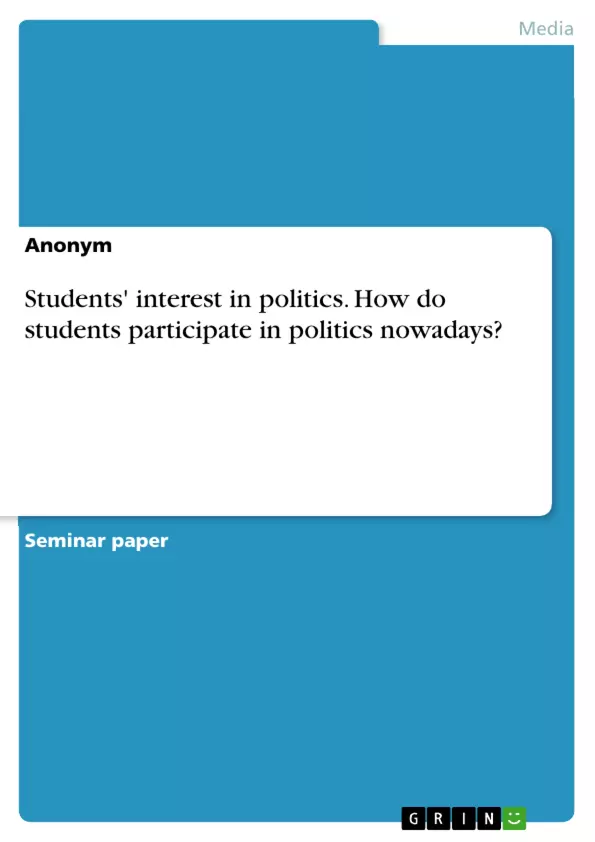The objective of this research project is to find out how students participate in politics nowadays – meaning what political participation means to them, whether and how they get involved, what motivates them and what might also prevent them from actively participating in politics. By gathering more information about their ways of obtaining news and how especially students discuss and pursue politics and current affairs, it is possible to understand better how young people can be approached and how they envision successful participation.
Students have historically initiated and inspired national liberation movements, political parties, as well as labor organizations and cultural groups. In some countries, they have succeeded in influencing governments and changing policies, for example with regard to equal opportunities in education and better learning conditions. Therefore, the question that repeatedly leads to discussions is whether and to what ex-tent young people today are political and what influences their engagement with politics. Students in particular represent a relevant group in this context, partly for the reason that it is likely that many individuals who will later take on relevant roles in public life will emerge from this group. In addition, it can be assumed that trends and media developments that are also important for politics and political organizations arise early on in the student environment.
Table of Contents
- Introduction
- Research Objectives
- Structure of Research
- Interest of Students in Politics
- Engagement of Students in Politics
- Social Media and Politics
- Research
- Research Design
- Interview Guideline
- Pilot Test
- Data Collection
- Analysis and Presentation of Results
- Participation in Politics
- Social Media and Politics
- Reflection
- Conclusion
Objectives and Key Themes
The objective of this research project is to explore the political participation of students in contemporary society. It aims to understand their perceptions of political engagement, their motivations for involvement, and the factors that might hinder their participation. The research delves into how students obtain news, discuss political issues, and envision successful participation in politics. Additionally, the study examines the influence of social media on students' political participation, considering the changing landscape of information access and sharing.
- Political engagement of students in contemporary society
- Students' perceptions of political participation
- Motivations and obstacles to student political involvement
- Influence of social media on student political participation
- Shifting landscape of information access and sharing in political discourse
Chapter Summaries
- Introduction: This chapter introduces the topic of student political engagement and highlights the historical significance of students in shaping political movements and influencing policy. It outlines the research objectives and the structure of the study.
- Interest of Students in Politics: This chapter examines the prevailing perception of students' political knowledge and engagement. While there are concerns about their lack of interest in traditional forms of political participation, research suggests that students may be politically diverse and engaged in different ways. The chapter explores the increasing interest in politics beyond established parties and analyzes the role of social media in shaping political awareness and engagement.
- Engagement of Students in Politics: This chapter delves into the reasons why students may not readily engage in traditional forms of political commitment. It explores the perception of politics as abstract and intangible, the perceived lack of power among students, and the changing nature of political self-identification. The chapter also emphasizes the diverse political orientations of students and the factors that influence their level of engagement.
- Social Media and Politics: This chapter focuses on the impact of social media on how students access, share, and discuss politics. It highlights the rise of social media as a news source and its potential to influence political participation. The chapter also considers the evolving role of social media in the broader landscape of information consumption and political discourse.
- Research: This chapter outlines the research design and methodology employed in the study. It explains the rationale for using a qualitative research approach and describes the development of the interview guide, the selection of participants, and the data collection and analysis process.
Keywords
This research focuses on the political engagement of students in the digital age. The study explores the key themes of student political participation, perceptions of politics, social media influence, information access, political discourse, and the changing landscape of engagement. The research aims to contribute to a deeper understanding of how students navigate the complexities of contemporary politics and their evolving role in shaping political discourse and action.
- Citar trabajo
- Anonym (Autor), 2021, Students' interest in politics. How do students participate in politics nowadays?, Múnich, GRIN Verlag, https://www.grin.com/document/1187783



